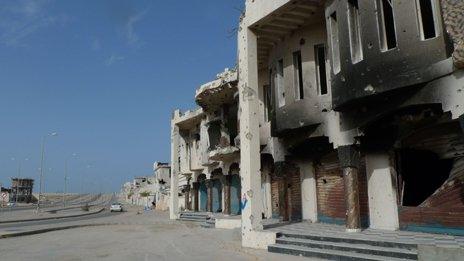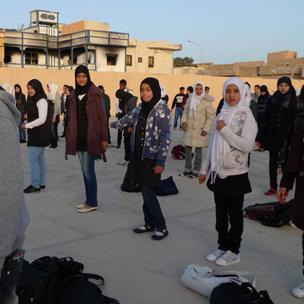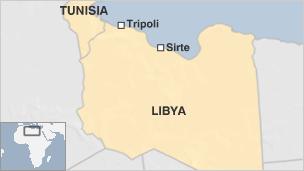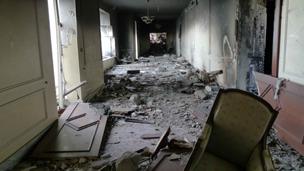Should Libya rebuild Gaddafi hometown of Sirte?
- Published

The final battle for Muammar Gaddafi's home-town last October was brutal and drawn-out.
Hundreds died on both sides, and it is hard to find a building undamaged by bullets or shells. Occasionally you see grotesquely twisted concrete structures, barely recognisable now, that were blown apart by Nato bombs.
But the money Col Gaddafi lavished on Sirte is also evident; the neat, whitewashed housing estates, the grand avenues and parks, and the imposing ministries and conference centres he built in his attempt to turn what had once been a little fishing village into a showcase capital city.
So what should happen to Sirte in the new Libya? There is no consensus yet.
Gaddafi 'still in our hearts'
The transitional government is promising to rebuild it, although this is unlikely to be on the grandiose scale of the Gaddafi era.
"All the other town councils agree that Sirte should be the priority for rebuilding," says Mohammed Kablan, the head of the new local administration.
"Everybody feels sympathy for Sirte."
He said around 60% of the town's inhabitants had come back, so repairing housing, schools and utilities was an urgent need.
At the Taleah al-Nasser school in District 2, the most battle-scarred part of Sirte, there are holes in the walls made by rockets; the whiteboards are peppered with bullet-holes.
They start the day with military-style exercises in the playground, like any other Libyan school.
When it comes to singing the new national anthem though, they can only find a handful of pupils able to sing it.
This is actually an old anthem, restored to celebrate the anti-Gaddafi revolution, and most of the children come from families who remain defiantly loyal to the former ruler.
"He is still in our hearts," one of the teachers told me.
'Bad, sad and angry'
You hear that a lot in Sirte. I asked the older pupils what they thought of the changes in their country. Most were too nervous to say.
But one girl spoke up. "What happened in our town is a disaster," she said.

Only a few children at this school know the new national anthem
"They attacked us in our houses and looted them, they destroyed everything."
She dismissed the revolution. "Nothing has changed," she said, "just a different flag they put on our schoolbooks."
Her teacher, Shifa Hassan, has noticed what effect the defeat of Sirte has had on its inhabitants.
"The psychology of people is very bad," she said. "They are very sad, very angry and very aggressive."
Another teacher at the school started shouting, in tears, about the deaths of six family members during the fighting. She blamed Nato.
Everyone at the school complained about being abandoned by the new government.

There is no running water, and many of the houses in District 2 are uninhabitable. The needs are obvious.
But can the government make a town that identifies itself so strongly with Col Gaddafi a priority?
There is a risk of an angry backlash from other towns like Misrata, which also suffered extensive damage, and fought to bring the Gaddafi dictatorship down.
I have met many people in Misrata who believe Sirte should be wiped off the map.
Gaddafi stain
Deputy Prime Minister Mustafa Abushagur insists Sirte will get fair treatment.
"It's our obligation to provide services for them," he said. "We are one country, one people and we must make sure that we learn how to live together again."

Col Gaddafi's house in Sirte was the nerve-centre of his regime
He said the government had already contracted companies to build pre-fabricated schools for Sirte.
With oil production almost back to normal, there should certainly be plenty of funds for reconstruction throughout Libya.
They will have to decide what to do with the outsized ministry buildings and other prestige Gaddafi projects disproportionate to a population of around 70,000.
They will also have to decide what, if anything, will be left of Gaddafi's imprint on his birthplace.
His home, surrounded by a sprawling farm on the edge of Sirte, lies in ruins.
It is deceptively peaceful now, the ground carpeted with early spring flowers.
The buckled walls and gaping holes in the ceiling are mute testimony to the ferocity of the bombardment of this, the nerve-centre of Gaddafi's eccentric and violent regime.
You can wander through the labyrinth of rooms, and down into the network of concrete bunkers under the house, blown open by Nato bombs.
I met Abdul Salim there - unusually for a Sirte resident, someone glad to see Gaddafi gone. But he too complained of the new government's neglect.
"The problem now [is] nobody talks about Sirte, nobody visits," he said.
"The Transitional Council [leader] Mr Abdul Jalil, he should have spoken to Libya from Sirte after Gaddafi had gone, to send a message that there is now no difference between cities."
But its peculiar history makes Sirte different in the eyes of most Libyans. The stain of being favoured by Gaddafi for so long will be hard to rub off.